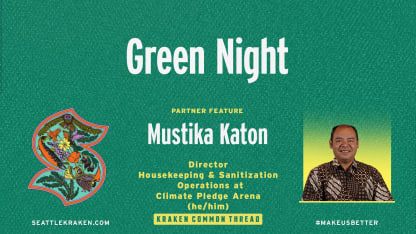A knack for resourcefulness inadvertently helped Mustika Katon avoid getting caught up in a riot at the very first rock concert he attended.
That was back in his native Java, Indonesia, in October 1988, when Mick Jagger and the Rolling Stones came to the island’s biggest city, Jakarta, and chaos erupted outside Senayan Stadium because of ticket costs. But Katon and his group of about 15 other teenagers avoided the mayhem that injured scores of the 70,000 people trying to get in and another 30 security officers, as well as leaving 100 cars demolished and windows smashed.
“We didn’t see any of that because we weren’t trying to buy tickets – we just climbed the fence,” Katon, 52, said with a chuckle. “We waited until we found a place where the security guards weren’t looking, jumped over and stayed inside. We saw the concert and didn’t see any of what was going on outside.”
These days, as Director of Housekeeping and Sanitizations for Climate Pledge Arena, Katon now breezes through the front entry of his sports venue workplace unimpeded. But his resourcefulness and decades of experience is something heavily relied upon to help Climate Pledge maintain its sustainability goals.
“The thing is, we try to think outside of the box,” Katon said. “We try to look at what the standard is, and we say, ‘OK, how can we make this arena better than other arenas?’ ”
With Green Night, pres. by Boeing, being celebrated at Saturday’s Kraken home game against the St. Louis Blues, Katon is aware of the importance placed on sustainability by both the hockey team and its arena.
And he's all about streamlining and efficiency to make that happen. Also about conveying a message of sustainability that everyone working within the arena needs awareness of for subsequent cleaning to go beyond the surface and have a more lasting impact.
It starts with limiting the types of items that will eventually need to be cleaned from the arena bowl once events end.
“It’s about communicating with the vendors and others about what items within the arena have to be,” Katon said. “It has to be either recyclable or compostable.”
That’s the main difference from his job now and a prior career handling similar operations as a hotel and cruise ship executive.
With roughly 150 employees under him at the vendors he manages at any given time, his resourcefulness comes into play with the operating procedures he has in-place for things such as postgame arena cleaning. To achieve “zero waste,” he’ll have crews sort through trash and separate it as they collect it in the arena bowl itself – some groups carrying buckets with cleaning liquids to sanitize while others carry blue buckets for recyclables and green buckets for compostable waste.
“We achieve a lot of efficiency that way,” he said. “Because we clean the bowl, but we’re also doing our sorting out on the bowl itself.”
While the arena only sells concessions in sustainable packaging, a challenge comes with outside food and beverages brought in.
“Especially some of the employees,” he said. “They come in with their own food. We try to educate them to try to minimize it. We’ll tell them that if they bring it in Tupperware, they can just wash it out after and bring it home and reuse it instead of bringing in food from all the places around the arena with wrapping that will go right into a landfill or something like that.”
In many ways, the cleaning part hasn’t changed much since the days he first came to Seattle in 1994 to work for the Holland America cruise ship line shortly upon graduating from a tourism management school in Jakarta. Katon spent eight years here, moved back to Jakarta to teach at a Holland America training school there, then returned to Seattle in 2005 in an assistant executive and later executive housekeeping role for the cruise line.
Soon after, in 2007, he met his wife, Kelly, a Seattle native and fellow crew member on one of the ships. By 2014, he’d joined the Hilton hotel chain, eventually becoming a director of housekeeping there, then later took a director of facilities and housekeeping position with the InterContinental-run Staybridge Suites and EVEN Hotel.
Katon said the jump from cruise ships and hotels to his Climate Pledge role in February 2021 wasn’t as big a shift as some might think.
“It’s nothing different, really,” he said. “Because on a cruise ship, we’d have to flip all 1,050 rooms within four-to-six hours. So, it’s similar. And I’m really familiar with the industry.”
That part helps when it comes to cleaning product vendors he’ll lean on from his prior roles. He’ll choose all the cleaning chemicals, ensuring they are eco-friendly, and make sure all vendors or subcontractors he brings in are up-to-speed on dos and don’ts about what can be brought into the venue.
“I try to work closely with my friends from Washington that I knew closely from my past work beforehand,” he said. “They can help us with support and give us things we really need for the arena.”
And when he isn’t keeping the arena clean for Kraken games, Katon lends his own support to his Seattle-born goaltender son, Kai, who plays hockey for Kent Valley’s 10U team. Watching his son has helped him better appreciate some of hockey’s intricacies after growing up in soccer-wild Indonesia.
“I find it very interesting,” he said.
One job perk is all the Kraken games he now gets glimpses of on work nights to hone his hockey knowledge. And then, there are the concerts: Not only when cleaning but also first crack at shows on nights off.
Meaning his days of climbing fences in the name of free music are long done.



















